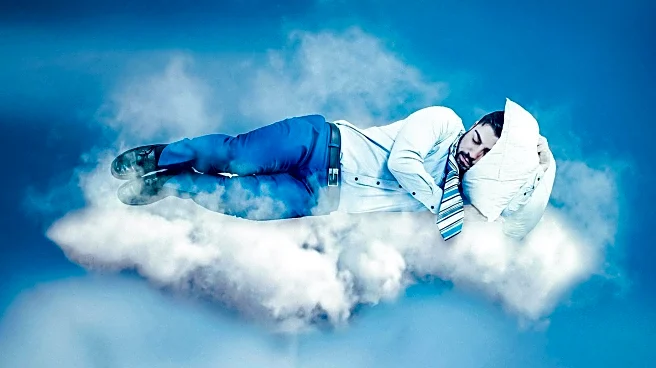What's Happening?
A recent study led by Flinders University has identified a phenomenon termed 'social apnoea,' where the severity of obstructive sleep apnoea increases during weekends. The research analyzed sleep data from over 70,000 individuals worldwide, revealing that participants were 18% more likely to experience moderate to severe apnoea on Saturdays compared to Wednesdays. This condition, characterized by repeated pauses in breathing during sleep, is exacerbated by lifestyle changes such as alcohol consumption, smoking, and irregular sleep patterns. The study highlights that untreated sleep apnoea can lead to serious health risks, including heart disease, type 2 diabetes, depression, dementia, and accidents due to poor sleep quality.
Why It's Important?
The findings underscore the underestimated impact of sleep apnoea on public health, particularly during weekends when lifestyle habits change. The study suggests that the condition's severity may be overlooked in clinical assessments typically conducted on weekdays. This has implications for diagnosis and treatment, as the variability in severity could affect treatment decisions. The research also raises concerns about the common practice of skipping continuous positive airway pressure (CPAP) therapy on weekends, which may worsen symptoms. The broader significance lies in the potential health and safety risks posed by increased apnoea severity, affecting cardiovascular health, mental well-being, and accident rates.
What's Next?
The study calls for a reevaluation of current diagnostic and treatment practices for sleep apnoea, particularly the timing of assessments and the use of CPAP therapy. Researchers recommend maintaining a consistent sleep routine and using prescribed therapies every night, including weekends. The findings may lead to changes in clinical guidelines and public health strategies to better address the condition's variability and improve patient outcomes. Further research could explore the underlying causes of the weekend spike and seasonal variations in apnoea severity.
Beyond the Headlines
The study highlights the need for increased awareness of sleep apnoea's impact on health and safety, particularly in relation to lifestyle habits. It suggests that even small increases in severity can have significant implications at a population level, potentially influencing public health policies and safety regulations. The research also points to the importance of considering behavioral and environmental factors in managing sleep disorders.









